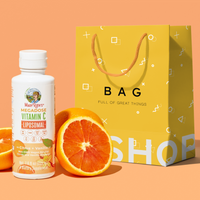
FEATURED
BY COLLECTION
FIND MARYRUTH'S IN STORE!

STORE LOCATOR
Now you can find your all-time faves and discover some exciting new products while you're out shopping.
GET STARTEDFrom conception throughout life, our bodies rely on various macronutrients (like protein, carbohydrates, and fat) and micronutrients (including vitamins, minerals, and amino acids) to survive and support our bodily processes and overall health.
Though micronutrients are important at all ages — and there are essential vitamins and minerals are micronutrients we all need yet our bodies cannot make on their own — there are some vitamins that are especially important for specific reasons during adolescence.
Below are five vitamins and minerals that you should ensure are being incorporated into your child’s diet. We always recommend a food-first approach, and then supplementing where needed to fill in any gaps!
Vitamin A is one of thirteen essential vitamins. Vitamin A supports normal growth and development in children, supporting tissue, bone health, and vision.
This vitamin can be found in the form of beta-carotene in many yellow and orange-colored foods, such as sweet potatoes, carrots, pumpkin, and squash. Leafy greens like broccoli, kale, and spinach are some other plant-based food sources of vitamin A!
Vitamin D is an essential vitamin with two main types: D2 (ergocalciferol) and D3 (cholecalciferol).
Cholecalciferol, also known as vitamin D3, is the same type of vitamin D your body makes when exposed to the sun! Vitamin D3 works to help build bones & teeth, assisting the body in mineral absorption.
That’s right — not only calcium is important for bone health! Vitamin D also supports phosphorus absorption and calcium balance.
The most natural way many of us can get vitamin D is through the sun. Very few foods have naturally occurring vitamin D, and the majority that do — such as fatty fish, egg yolks, and beef — are not vegan-friendly.
One of the only naturally occurring, vegan-friendly foods that can be a good source of vitamin D are mushrooms. Otherwise, supplementing may be necessary if you find that your child does not have adequate levels of vitamin D in their body.
Vitamin C is an antioxidant best known for its immune-supporting properties. As children’s immune systems are building and developing, it’s important to support it!
By limiting the damage done by free radicals, vitamin C’s antioxidant properties are vital for the body’s processes.
But vitamin C doesn’t only support immune health; it is also an essential cofactor in the synthesis of collagen, a protein that is vital to the health of multiple parts of the body including blood vessels, bones, and skin!
Many foods that you probably already incorporate into your diet contain natural vitamin C! Some examples include oranges, clementines, grapefruit, bell peppers, tomatoes, potatoes, and leafy green vegetables.
While zinc is not a vitamin, it is an essential mineral that our bodies need but cannot produce on their own.
This trace mineral is needed for several bodily processes, including immune function, certain gene expression, DNA repair, skin integrity, and cellular metabolism.
The optimal concentration of zinc in the body is necessary for healthy immune function, and sufficient levels of zinc in growing children may support brain function and cognitive development.
Naturally occurring sources of zinc include chickpeas, nut butter, spinach, oatmeal, and asparagus.
Vitamin E is considered an essential vitamin for everyone, and it is important for children.
Vitamin E is an essential cofactor for the health of multiple parts of the body including the heart, brain, and skin. As an antioxidant, vitamin E also limits the damage done by free radicals while supporting immune function and overall well-being.
Some natural, vegan-friendly sources of vitamin E include sunflower seeds, almonds, peanuts, broccoli, kiwifruit, and mango.
MaryRuth’s was created by a mother of four who wanted to create products that she feels comfortable giving to her own family. We are happy to carry many supplements for children to help support your family’s needs and lifestyle when needed.
As we are working towards all of our products being Clean Label Project certified, we want you to feel great about what you give your children!
Health education made easy!
your shopping bag